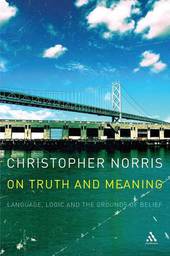
|
On Truth and Meaning: Language, Logic and the Grounds of Belief
Paperback / softback
Main Details
Description
Christopher Norris presents a wide-ranging and distinctively angled perspective on many of the most challenging topics in current philosophical debate and explores a range of issues in epistemology, ethics, and philosophy of mind, language, and logic. The book marks a further stage in the author's project of developing a realist, truth-based approach that would point a way beyond the various unresolved dilemmas and dichotomies bequeathed by old-style logical empiricism. In a series of closely argued chapters Norris draws out the two chief kinds of deficit - normative and causal-explanatory - that have characterised much recent work in the analytic line of descent. He gives a shrewd diagnostic account of the rift that opened up between the two traditions of contemporary philosophic thought, one consequence of which was the analytic failure to develop precisely those normative resources that were needed in order to break out of that impasse. The book also engages critically with the work of Donald Davidson, Saul Kripke, John McDowell, Hilary Putnam, Neil Tennant, and Crispin Wright, and mounts a vigorous challenge to the prominent strain of anti-realist thinking developed on logico-semantic and metaphysical grounds by Michael Dummett.
Author Biography
Christopher Norris is Distinguished Research Professor in Philosophy at the University of Cardiff, Wales, and has taught at many universities in India, Australia, Greece, Spain, Germany, Canada, China, the US, and elsewhere. He is the author of numerous books on aspects of philosophy, critical theory, and modern intellectual history.
Reviews"Norris continues the complex bridge-building project of his four previous books (Hillary Putnam, CH, Mar'03, 40-3942; Against Relativism, CH, Apr'98, 35-4452; Reclaiming Truth, CH, May'97, 34-5019; and Truth and the Ethnic of Criticism, May'95, 32-5013) to defend a "normatively adequate" realist account of knowledge, rational explanation, and reference. Chapter 1 reviews debates over psychologism from Frege to Quine and Dummett, then offers an alternative, normatively adequate naturalized epistemology inspired by Philip Kitcher. Chapter 2 continues a similar line of realist argument in light of debates by Quine, Davidson, and Mcdowell over the "three dogmas" of empiricism. Chapters 3 and 4 develop Norris's position with particular reference to scientific knowledge and natural-language interpretation. Chapter 5 turns to Continental thinkers from Sartre to Derrida for overlooked insights on how to understand the question of doxastic responsibility. Finally, in chapter 6 Norris brings his realist arguments to bear against Kripke's reading of Wittgenstein on following a rule and its resultant communitarian account of knowledge. This chapter includes discussions of replies to Kripke by Wright Tennant, and McDowell. Though not a book for beginners, this study, with its impressive scope, will help greatly advanced students and scholars interested in the variety of so-called analytic and Continental traditions." -- R.M. Stewart, Austin College '...Norris engages in a series of closely argues, though not overly technical, reflections on the debate between various aspects of epistemological realism and anti-realism.' Mark Vernon, TLS -- Mark Vernon * TLS *
|